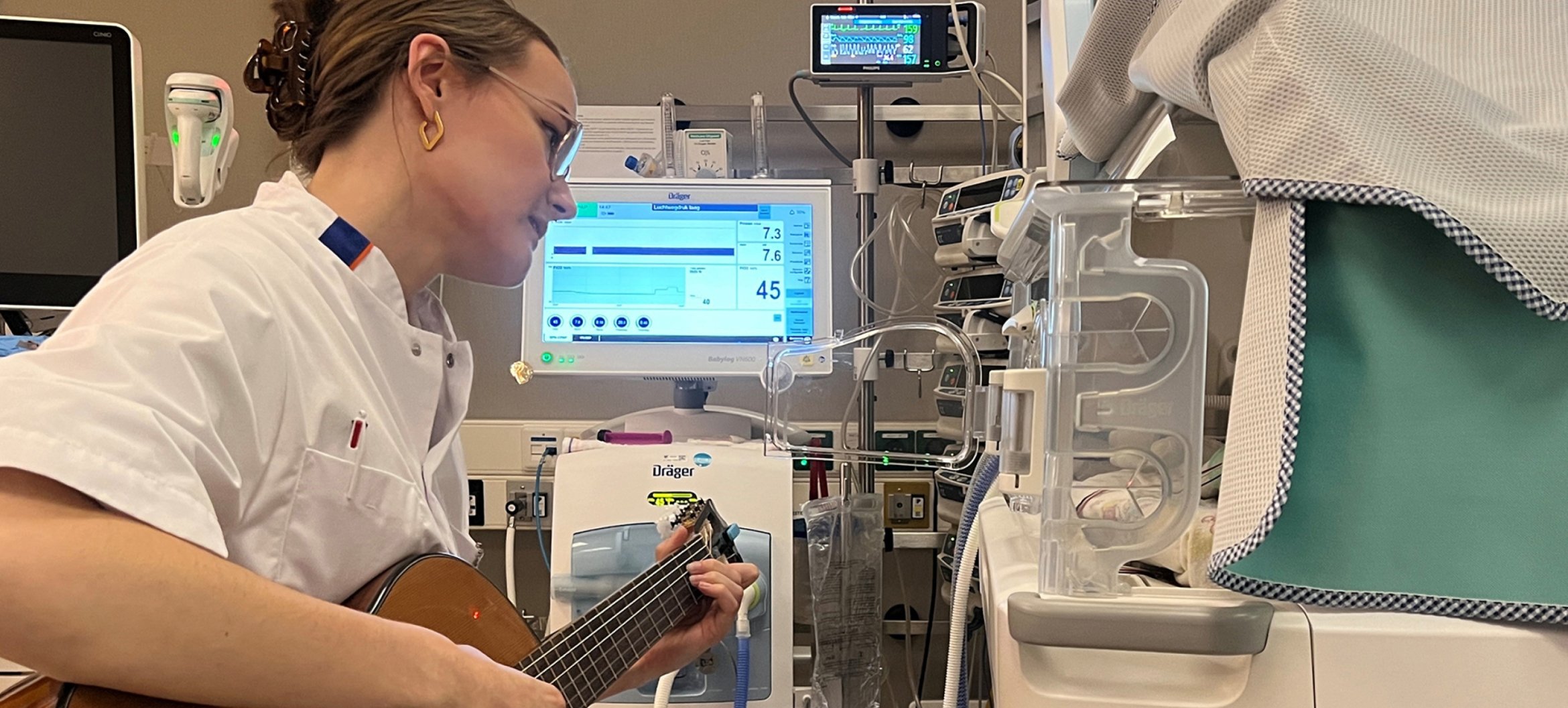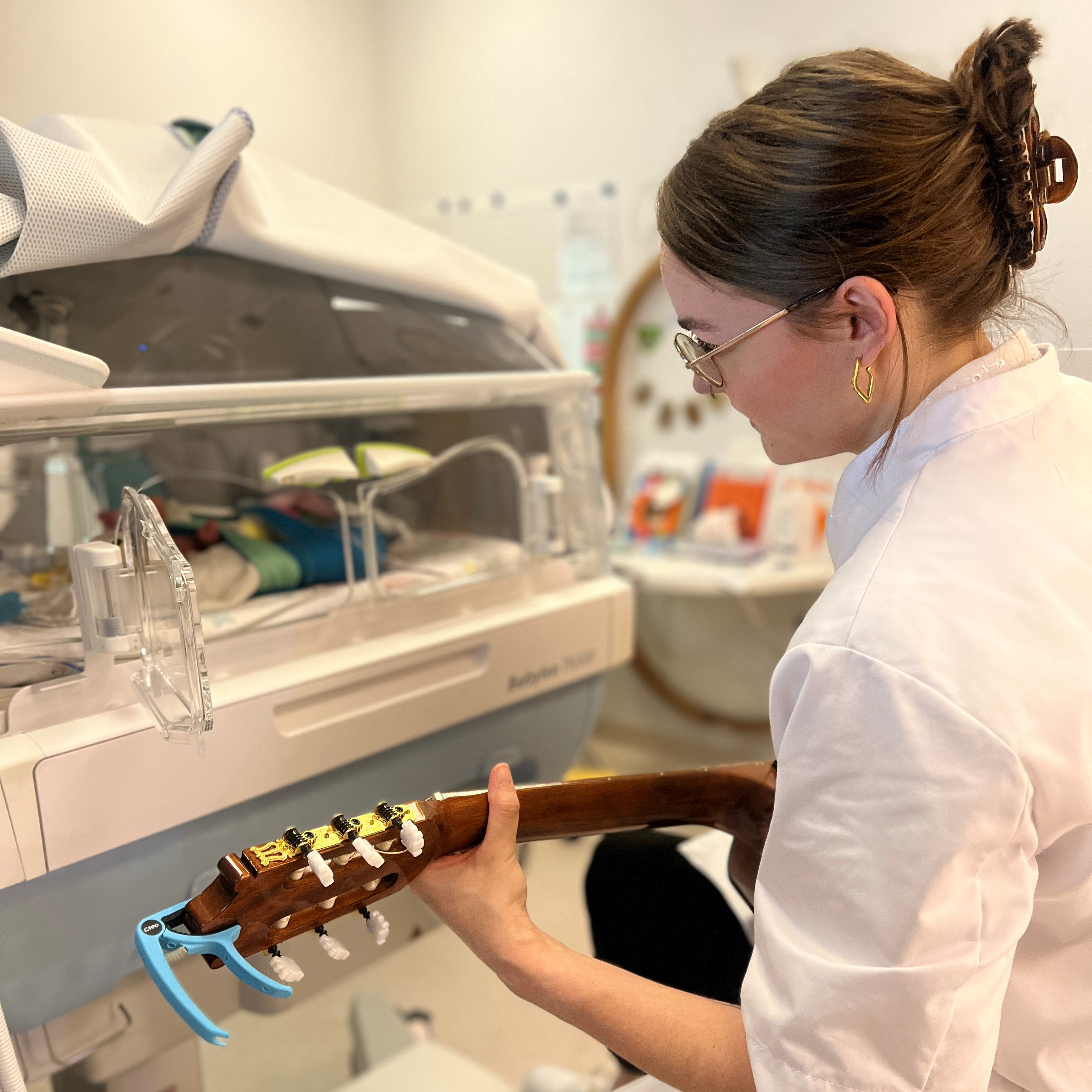Melodies of hope: music therapy for premature babies
- Music
At the Neonatal Intensive Care Unit (NICU) of the University Medical Center Groningen, Music Therapy bachelor's graduate, Janneke Oldengarm brings not only melodies but also hope and consolation. She was first introduced to music therapy during a visit to the ArtEZ open day. That was the start of a deeper journey, resulting in following the master's course Music Therapy that provides the professional underpinning for her work at the NICU.

"I actually didn't know music therapy even existed until I went to the ArtEZ open day," says Janneke. "I'd always had a kind of ‘antenna’ for helping people, something I noticed in many of my fellow students. It was a combination of the desire to work with people and a passion for music that led me to choose music therapy."
From unkowing to passion
Although Janneke didn't have much experience with music, she was determined to improve her skills. She decided to take extra classes in singing and music theory in order to be able to audition for the Music Therapy bachelor's course. To her surprise, she was accepted after just one try. And now, nearly 6 years later, Janneke gets to use the title Master of Arts in Music Therapy. Whilst still studying, she got a job at the NICU, where she conducted her graduation research into potential applications of music therapy for premature babies and their parents.

Master's in Music Therapy: in-depth and applied
Following her Music Therapy bachelor's course, Janneke decided to go on to the master's: "Despite my experience, I felt that I needed to deepen my knowledge. I had the feeling that I hadn't yet learned all that I wanted to learn." The impact of the master's course on her work is clearly visible. "It really helped provide the evidence base for my work, both when talking to colleagues and parents and in presentations to paediatricians throughout the country. Because our professional field is quite niche and relatively new, we get a lot of questions about exactly how it works. It's really a form of professionalisation, making a case for and justifying what you are doing."
As well as her theoretical knowledge, during the master's course Janneke also developed her practical skills. She recounts how she devised and tested various interventions, including a music therapy group for parents. Although this specific project did not produce the desired results, it was an instructive experience that yielded valuable insights and encouraged her to concentrate on individual approaches that would better meet parents' needs.
Creating connection through musical moments
"In my work at the NICU, I combine different musical elements such as guitar music, singing, gentle humming and an instrument called Ocean Disc to create a calming sound, similar to the waves of the sea," explains Janneke. The goal of this music therapy intervention is to offer the babies a familiar sound, comparable to the sound of their mother's heartbeat in the womb, and to make the transition easier for these vulnerable little ones.
In addition, Janneke performs special interventions in which she records the heartbeats of babies that may not survive. She explains: "We filter out the background noise and bring the heartbeat to the front, using that rhythm as the basis. On top of that we then record a song the parents have chosen that represents a significant memory of their child. Whether it stands for love, saying goodbye or something else. We make a personalised version with guitar and voice that matches the tempo and rhythm of the heartbeat. We primarily do that if the situation is critical; it is intended to provide a lasting memory."
My role is to offer those precious contact moments and to get across the feeling of 'we are here together as a family'."
Parents often experience the NICU as stressful and anxiety provoking, seeing their little ones connected up to all kinds of equipment. Janneke emphasises her role: "My role is to offer those precious contact moments and to get across the feeling of 'we are here together as a family'."
Janneke has a message for music therapists and future students who are considering doing a master's course:
"If you are interested in deepening your knowledge, making your work more evidence-based and conducting research, then a master's course is for you. It isn't just adding to your expertise, it is also a valuable investment in yourself and your career."
Read more about the master's course Music Therapy
Follow Janneke’s work


